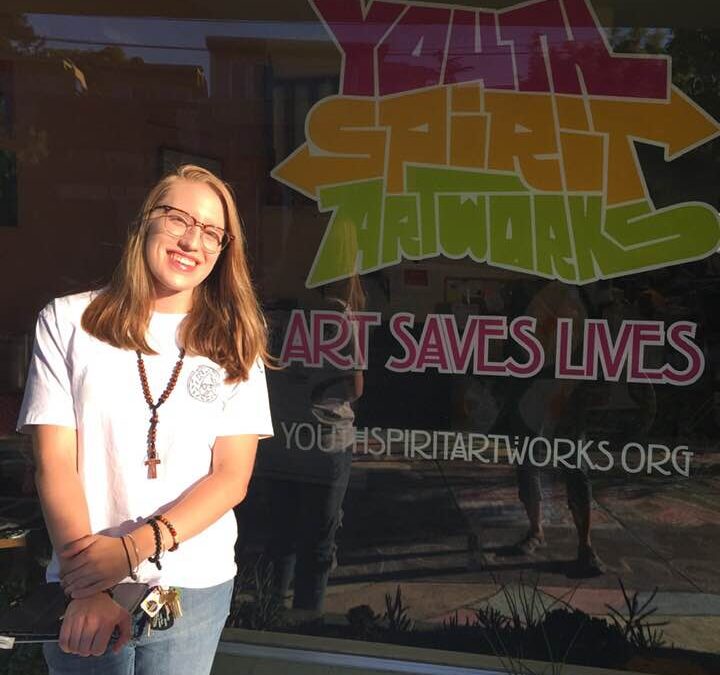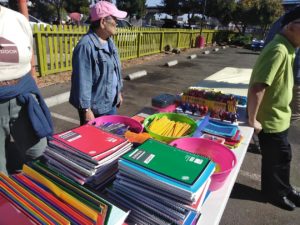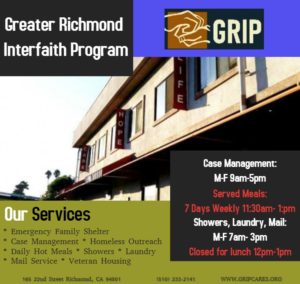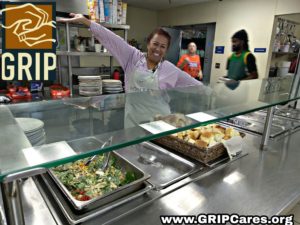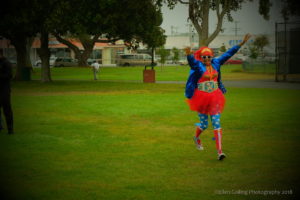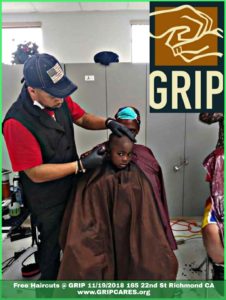When people think of a “board of directors” they might imagine an illustrious cabal of gray-haired old men in three-piece suits, maybe seated in leather swivel chairs in a wood paneled office, aka “the Board Room,” making plans, the smell of cigar smoke thick in the air. The reality of being on a non-profit board is it’s a mix of, well, sometimes gray-haired people, with relevant life experience, in a position of leadership in the community or with a strong heart for service or usually both, making plans while on Zoom at all hours, or seated on folding chairs gathered around a well-worn Formica table, after a 11-hour day.
The board of directors at GRIP is similar — a mix of civic leaders, faith community leaders, and just leaders, who care about those without food or a home. Among them is the youngest board member in recent memory, and perhaps the youngest board member ever, Jilly de la Torre. The board was thrilled to vote her in this year, given her new perspective paired with a surprising number of years of service to the unsheltered community. Her story tells a lot about why GRIP is successful, and why perhaps YOU, the person reading this, might be a good candidate for our board of directors.
What led you to GRIP? Why do you feel called to do something about homelessness?
I’ve been volunteering for GRIP since I was a little kid. The congregation that I’m a part of, Hope Lutheran Church in El Sobrante, is one of GRIP’s 41 member congregations, and they’ve been sending a team of volunteers to the Souper Center once a month for decades now. My family tended to volunteer most around the holidays, and I remember playing with my sister (and causing trouble, honestly) in the kitchen in between handing out sandwiches to the families who came in to eat lunch. I also grew up volunteering for another local nonprofit called Rebuilding Together, so community-based work was always close to my heart. When I was living in Portland as a freshman in college, I started working at a homeless resource and navigation center, and I loved it. I found a passion for working directly with folks struggling with homelessness and other challenges, as I’ve always been a caretaker at heart. Over the years, I dabbled in many different jobs – at a food pantry, at an elementary school, at a workers’ rights organization for day laborers, as an advocate for survivors of domestic and sexual violence, and more – to get a feel for different kinds of social work. I’m currently getting my master’s degree in social welfare from UC Berkeley, and I hope to focus my future work on systems-level and policy changes. I recognize that when we fully address the larger problems of our society, we are creating space for the possibility of a better, safer future for the individuals we know and love, and this is what drives me toward a career in social work.
What were you doing before you joined the board, and how did that inform your decision?
I left my last job to attend grad school, which freed up some of my time to try my hand at new things for the first time in a few years. I was working at a transitional housing program that was actually the first (official) village of tiny houses for homeless young adults in the country. I was a case manager there, among other roles. The Village was a new program that we built (literally) from the ground up, so being one of their founding staff members and working through that process allowed me to learn a lot about how nonprofit and community-based work is structured, funded, and governed. I became curious about how I could continue to engage in housing work in different ways to support people in my home community.
How has your life experience, background, culture, and identity prepared you for being on the board?
I grew up in the East Bay (in El Sobrante, here in West County), and I’ve seen the way the neighborhoods that I’ve known and loved have already changed tremendously just in the last couple of years. Our families and neighbors are really struggling. There’s just not enough affordable housing to keep everyone off the streets. Being involved in my community has always been important to me, and as a part of the GRIP team, I can apply my passion for working toward housing and economic justice right in my own backyard.
Most 20-somethings don’t join boards of directors. How did you feel joining the board?
I was a little nervous at first – most of my social work experience has been in direct service, so it felt a little daunting to take on a role that felt more administrative, especially because I’m very cautious of stepping into any role that feels bureaucratic, or that feels like “power-over.” But, I’ve been excited to take on projects that help me to channel my gifts for person-facing service and to get to know the GRIP staff and clients, such as working alongside the case management team (and, I continue to volunteer in the kitchen). My previous jobs helped me to understand the potentials and shortcomings of nonprofit Boards, and this piqued my interest about how these can be cultivated to best serve their organizations. And, it helped that GRIP and Richmond were familiar to me, and I felt encouraged by current and former Board members who are also members of my church community.
What do your friends think when you say you’re on the board of directors or you have to join a board meeting so you can’t go out?
Haha! I have a lot of commitments to juggle right now, so my friends and partner are thrilled with me whenever I have a chance to chill and just be a human.
What has been most meaningful to you since joining the board?
It’s been a blast chairing the Harmony Walk committee. I attended Harmony Walks when I was young and have fond memories of them. Building GRIP’s relationships with neighboring organizations, donors, volunteers, and local businesses has been a very valuable learning experience for me, and I love getting people excited about supporting GRIP’s work. I’m already looking forward to next year’s event.
What surprised you about being on the board?
Well, Ralph Payton is great! And isn’t a functional executive director always somewhat of a surprise in a nonprofit? 😜 I’ve also been pleasantly surprised at the flexibility that the board has to adapt to shifting circumstances, take on new projects, and move quickly to make needed changes. It’s refreshing to work with a team that synthesizes a diverse range of experiences and skills so smoothly.
What advice would you give to other 20-somethings about joining a non-profit board?
The dominant culture of professionalism – and we definitely see this in the non-profit industrial complex – seems to foster this narrative that you need to be far along in your career, or need to have accomplished “x, y, z,” in order to do meaningful work in a position of leadership, but I think that the opposite is often true. People who are younger and newer to the workforce often have the freshest perspectives, more stamina to push for bigger changes, and more of a visionary sense of hope, and this is often really needed in leadership teams – especially in nonprofit governance structures, where board members may be former staff members or other professionals who have been in their field for a long time and may not have the same eye for the bigger picture. Everyone’s perspective is important – this is especially true if you grew up around the community you want to work with, or have lived experience with the issue at hand. Your voice is needed!
If you or someone you can recommend is interesting in joining GRIP’s board, please reach out. GRIP is actively looking to expand its board of directors to include more people, more voices, and more perspectives. Please email Ralph Payton <[email protected]> to find out more or recommend someone.

